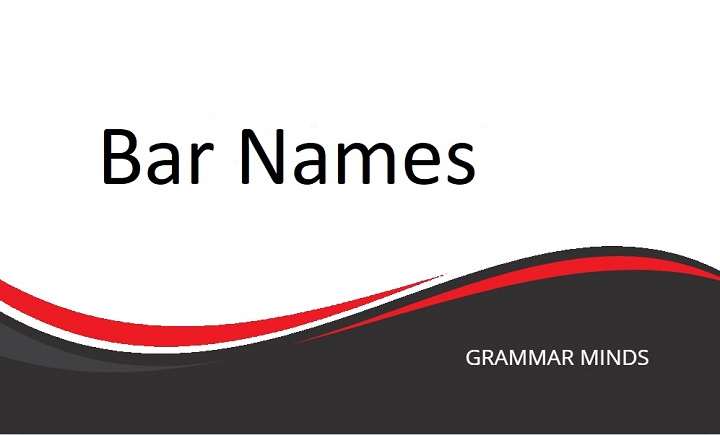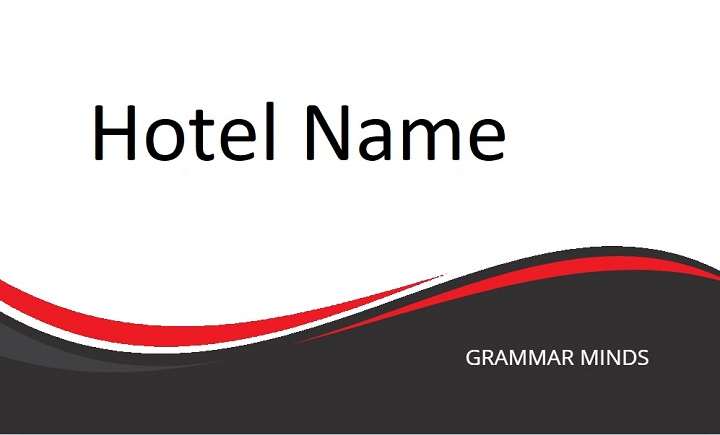Choosing the right name for your bar can be the difference between blending into the crowd and becoming a local hotspot. The name is the first impression you make on potential patrons, so it must capture the essence of your bar, its vibe, and what it offers. In this article, we’ll explore why bar names matter, how to brainstorm ideas, what to avoid, and some inspiring examples to get your creative juices flowing.
Why the Bar Name Matters
The name of your bar is more than just a label—it’s a brand. It encapsulates your bar’s identity, sets the tone for your target audience, and helps in establishing your brand’s presence in the competitive nightlife market. A strong name can:
- Attract Attention: A catchy or unique name can make your bar stand out in a crowded city. Potential customers are more likely to remember a name that resonates with them.
- Set the Vibe: Whether you’re going for a laid-back dive bar or a sophisticated cocktail lounge, the name should reflect the ambiance you aim to create.
- Spark Curiosity: An intriguing name can spark curiosity and draw people in to see what your establishment is all about.
- Enhance Marketing Efforts: A creative or memorable name makes it easier to promote your bar on social media, in advertisements, or through word of mouth.
Key Elements of a Great Bar Name
When selecting a name for your bar, several important factors should guide your decision. Here are the key elements to consider:
Memorability
You want a name that’s easy to remember. Complex, long, or difficult-to-pronounce names can turn people off or make it difficult for patrons to tell their friends where to go. A simple, catchy name is more likely to stick in someone’s mind.
- Keep it short (ideally one to three words).
- Use unique or playful wording that makes it stand out.
- Avoid names that are too generic or overused in the industry.
Alignment with Theme and Concept
Your bar’s name should align with the concept and theme of the establishment. If you run a sports bar, the name could reference sports terms or famous players. If you’re opening a tiki bar, a tropical, exotic-sounding name would be more appropriate.
- Think about the type of experience your patrons will have.
- Consider incorporating cultural references, historical elements, or even geographical nods that reflect your bar’s location or ethos.
- Test how well the name pairs with the decor, menu, and overall ambiance.
Emotional Connection
A great bar name can evoke emotions or spark nostalgia. People are more likely to visit and return to a place that makes them feel something. Whether it’s a sense of mystery, humor, or warmth, a name that triggers a positive emotional response can be very effective.
- Use words that resonate with your target audience.
- Play on puns or familiar sayings for added charm.
- Tap into local culture or history for added relevance.
Uniqueness
In a competitive market, a bar’s name must stand out from others in your area or niche. Ensure your name is not too similar to other establishments, especially those nearby. A unique name also makes it easier to build a recognizable brand.
- Do a thorough search to ensure your chosen name isn’t already in use by another business.
- Avoid cliches or overly trendy names that may age poorly over time.
- Consider how the name will sound in a crowded bar or on social media platforms.
Brainstorming Bar Name Ideas
Coming up with the perfect bar name can take time and creativity. If you’re feeling stuck, here are some brainstorming techniques that can help you generate fresh ideas:
Word Association
Start with a few words that describe your bar’s concept, location, or the experience you want to create. Then, branch out by thinking of related words, phrases, or cultural references. For example, if you’re opening a speakeasy-style bar, you might start with words like “prohibition,” “secret,” or “vintage,” and then expand to phrases like “hidden gem” or “time traveler.”
Historical and Cultural References
Look to history, literature, or pop culture for inspiration. A bar name that references a famous figure, location, or event can add depth to your brand. For instance, a bar located in a historical district could reference local history or famous landmarks.
- “The Alchemist” could be a nod to a classic book while also suggesting innovative cocktails.
- “The Gatsby” would instantly evoke the glamor of the 1920s for a sophisticated cocktail lounge.
Puns and Wordplay
Puns are a great way to add humor and charm to your bar’s name. Many successful bars use clever wordplay that’s memorable and entertaining, which can appeal to a broad audience.
- “Tequila Mockingbird” is an example of a playful twist on a classic novel title.
- “Ale’s Well” cleverly incorporates a popular Shakespearean phrase with a beer reference.
Local Flavor
Consider incorporating elements of your local culture, geography, or slang into the name. This can create a strong connection with locals and set you apart from chain establishments.
- “The Bay House” for a bar near the waterfront.
- “Brooklyn Brew” to highlight a specific neighborhood or city vibe.
Create a Sense of Mystery
Names that create intrigue or a sense of adventure can draw in customers. These names often work well for speakeasy-style bars or bars with hidden entrances.
- “The Blind Pig” references a classic term for speakeasies during Prohibition.
- “The Secret Cellar” suggests a hidden, exclusive venue.
What to Avoid When Naming Your Bar
While the creative process is important, there are certain pitfalls to avoid when choosing a bar name. Here are a few common mistakes to steer clear of:
Overcomplicating It
A name that is too long, difficult to pronounce, or hard to spell can be a turn-off for potential customers. Simplicity is key when it comes to branding and word-of-mouth promotion. Avoid using obscure or niche language that may alienate potential customers.
Copying Competitors
While it can be tempting to follow the trends or imitate a successful competitor, copying someone else’s name (or something too similar) will only confuse customers and undermine your brand’s uniqueness. Instead, aim to offer something fresh and original.
Offensive or Controversial Names
Avoid names that could be seen as offensive, insensitive, or too provocative. While you want to create a buzz, negative attention could harm your bar’s reputation in the long run. Steer clear of overly edgy or culturally insensitive terms.
Limiting Your Future Expansion
Don’t choose a name that’s too limiting for future growth. For example, naming your bar after a specific cocktail may make it hard to expand your offerings later. You want a name that’s versatile enough to grow with your business if you ever decide to branch out into new areas.
Inspiring Examples of Bar Names
Looking for a little extra inspiration? Here are some successful bar names and the reasons they work so well:
- The Tipsy Cow: This name is playful and memorable, using humor to evoke a casual, fun vibe.
- The Golden Toad: Intriguing and unique, it sparks curiosity and gives the impression of a whimsical, magical place.
- The Black Pearl: Instantly recognizable due to its association with pirate lore, it suggests an adventurous, mysterious atmosphere.
- The Rooftop: Simple and straightforward, this name clearly conveys the location and ambiance of the bar.
- Lucky’s Lounge: This name feels warm and welcoming, with a bit of retro flair, making it perfect for a laid-back, cozy venue.
Also Read
10 Better Ways to Say “Have a Great Week” in Your Conversations
The name of your bar plays a pivotal role in shaping its identity and success. It should be memorable, align with your theme, evoke emotion, and be unique. By taking the time to brainstorm creatively and avoid common pitfalls, you can choose a name that not only attracts attention but also helps build a loyal customer base.
Remember, your bar’s name is the first step in creating a lasting brand. Choose wisely, and you’ll be one step closer to creating the next must-visit spot in your town. Happy naming!







